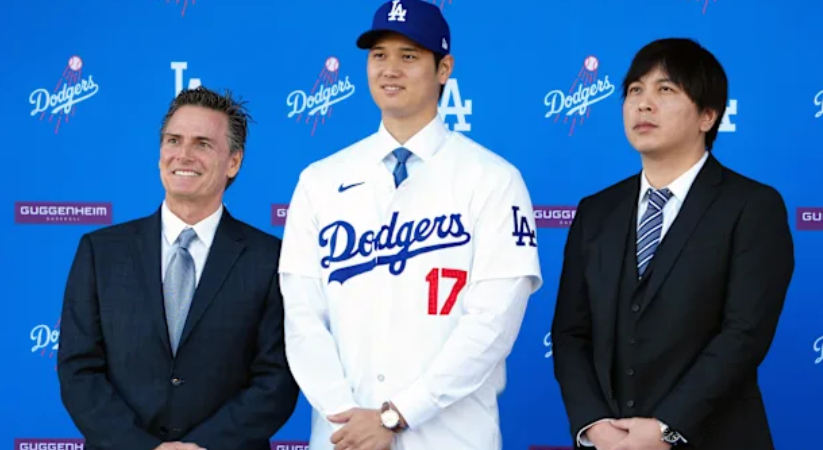Once a close confidant to Shohei Ohtani, a renowned MLB phenomenon known for his prowess both on the mound and at the plate, Ippei Mizuhara now finds his own story unraveled by greed and deceit. Instead of orchestrating seamless communication for Ohtani, Mizuhara is now orchestrating his daily life in a federal cell block, condemned to 57 months of behind-bar reflection for an audacious act of financial betrayal.
For years, Mizuhara’s role as Ohtani’s interpreter earned him a place in the athlete’s trusted inner circle. However, behind the professional façade lay a web of fraud, spun with manipulative banking maneuvers and the reckless impersonation of the very athlete he was supposed to support. His cunning exploitations allowed him to pilfer more than an eye-watering $17 million from the three-time American League MVP, an act that reads like a spectacular script from a Hollywood thriller centered on financial subterfuge.
The saga began unraveling in early 2024, when whispers about Mizuhara’s involvement in illegal gambling and financial misconduct transformed into sledgehammer revelations courtesy of an investigative exposé by ESPN. The discovery came like a torrential downpour for Mizuhara, who was subsequently dismissed faster than a strike from the Los Angeles Dodgers organization where he had been working until that stormy March. Federal authorities smelled the smoke of a potential fire and launched a criminal investigation, peeling back the layers of Mizuhara’s duplicitous dealings.
Court documents laid bare a tapestry of Mizuhara’s fraudulent activities. In a masterminded scheme, he tampered with banking security procedures, gaining illicit control of Ohtani’s personal accounts. With a brazenness that underlines his turpitude, Mizuhara impersonated Ohtani to authorize sham transfers and withdrawals, channeling the pilfered funds to assuage mounting gambling debts and fund his lavish lifestyle. The icing on his convoluted cake of fraud involved an ill-fated venture into the world of sports cards, where he splurged approximately $325,000 on memorabilia featuring legends like Yogi Berra and Juan Soto, along with Ohtani himself, his plan being to flip the cards for profit.
Ohtani’s recourse came bearing the power of a legal fastball when he filed a petition in federal court to reclaim his stolen sports card assets. Like a climactic scene in a courtroom drama, the gavel swung in Ohtani’s favor, with a judge awarding him rightful ownership of the high-end collectibles.
Mizuhara’s sentencing saw justice calibrated precisely. The imposing of nearly five years in a federal institution sounds the knell of his catwalk in Ohtani’s erstwhile trusted entourage. The mandate to repay a staggering $17 million to his erstwhile friend exemplifies restorative justice in all its fiscal glory. As for his showdown with Uncle Sam, Mizuhara owes an additional $1.1 million to the IRS for his cheeky little oversight in tax declarations. Post-incarceration, Mizuhara must embrace three years of supervised probation, shadowed by the encompassing threat of deportation, a looming whisper of goodbye from American soil.
The ripples of Mizuhara’s fraudulent caper have reverberated through Major League Baseball’s hallowed grounds, raising alarm bells about the financial safeguarding of sports stars. Ohtani, celebrated for his stoic commitment and professionalism, is yet to traverse the minefield of public discussion regarding the affair, opting instead for a composed silence that underscores his private battle with trust treason.
Yet, Mizuhara’s fall from grace isn’t purely a cautionary tale for athletes. The broader community of sports and collectibles is reckoning with the implications of this high-profile coup de finance. It underscores a pressing need for vigilance and robust oversight in an industry where the line between advisor and charlatan can swiftly blur under the shimmer of dollar signs.
Mizuhara could potentially act as a catalyst for reform, igniting transformations in how athletes manage their fiscal fortunes and redefining the protocols that protect them from financial vampires lurking in the shadows of trust. However, long after this saga has closed in the annals of MLB, its lessons might continue bewitching an industry tenderly learning where not to throw the ball—or a misplaced trust curve.
